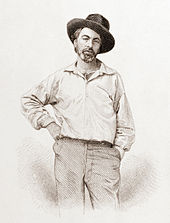There was beach and catching up with old friends and good food and lovely places as well as the books.

The first of many scenic picnic spots, with Prue, dappled.

The birthday pile – presents from Prue, along with a fifteen-session ticket to Writers’ Week.
The books part began with the birthday pile. And there was one more book for the birthday morning the day after we arrived in Auckland. A and F were as welcoming as ever and there was catching up over Indian takeaways and wine. I mentioned to them that I was about to do an online course about Walt Whitman and A found a copy of Leaves of Grass that had been given to her mother by the mother’s grandfather and had annotations. Lovely. A also gave me the booklet Howl by Alan Ginsberg that has a poem about Whitman in it that includes the wonderful line, “who killed the pork chops? and talked about teaching Whitman early in her university career.
At dinner with my son and his girl-friend, he pressed upon me his copy of Under the Banner of Heaven by Jon Krakauer, which looks into extremes of religious beliefs in he United States. He has had an important influence on my reading, getting me started on science writers like Jarred Diamond.
When were further north, at Martin’s Bay, another A asked if I could explain to her why she likes some poets and not others. I’ve thought of a better answer since we left that goes something like this. There’s what the poem is about and there’s the words the poet has used. If either the content or the language strike a chord with me I like the poem. And if both what is said and how it is said come together to express something that really resonates with me I fall in love with the poem. Hardly profound, but I’m pleased that A set me off to thinking about it.

Prue with A (hidden) at Martin’s Bay
On the way back to Auckland we stopped off to see E and B. There was a copy of The Luminaries sitting on a sofa, so of course, among all the other conversation we talked about that. Back at A and F’s The Luminaries came up again and they resolved to buy and read it.
At dinner, prepared by A and F for six of us, J said that at the suggestion of a friend she was re-reading Three Women by Marge Piercy and moved by writing about caring for someone who had has a stroke, as she and her sister do their very best for and with their mother who has been severely incapacitated by a stroke. H talked about researching family history and delving into The Coming of the Pakeha to Auckland Province. We went to a party with A and F, and E, who I know only slightly, said how she had got some of my novels from the library and they had been a welcome and pleasant distraction from some difficulties over the summer. I liked hearing that. And later, an email from C, visiting from the UK, to whom I had given a copy of where the heArt is, saying how she had enjoyed it and making some thoughtful comments.
I finished The Flamethrowers, which I referred to last week, and ended up liking it more by the end. Author Rachel Kushner is coming to Writers’ Week in Wellington soon and I shall go and hear her. The other book I’ve read this holiday, also from the birthday pile, is Rachel Joyce’s The Unlikely Pilgrimage of Harold Fry. Harold sets out to post a letter and ends up walking the length of England to see the dying woman to whom the letter is addressed. This story could so easily have been mawkish, and it isn’t, it’s about regret and guilt and how what we do, or don’t do, determines what we think of ourselves and hence how we behave. It’s a lovely story, well told.

One of many Coromandel panoramas.
On Prue’s mind is on a contract she has recently signed to undertake another left-wing-feminist-economics book for a NZ publisher’s Ebook series. She and I are both resolving to do serious writing from April, when other commitments and The Wellington International Arts Festival are over. On the drive home we each talked at length about our writing projects and the kilometres flew by.






